Psychology Case Study: Dependent Personality Disorder in an Adolescent
VerifiedAdded on 2022/08/15
|11
|2574
|215
Case Study
AI Summary
This case study focuses on Carla, an 18-year-old exhibiting symptoms of Dependent Personality Disorder (DPD). The study analyzes Carla's clingy behavior, dependence on parents, difficulty making decisions, and sensitivity to criticism. It applies the DSM-5 criteria for diagnosis, exploring symptoms such as difficulty making decisions, seeking support, and fear of disapproval. The etiology section discusses potential causes, including overprotective parenting and separation anxiety. Social factors like lifestyle and living conditions are also examined. The study emphasizes the importance of Cognitive Behavioral Therapy (CBT) and potential medication for managing DPD. The case study concludes that Carla needs professional help, including psychotherapy and possibly medication, to develop independence and manage her condition effectively. The paper includes a bibliography of relevant sources.
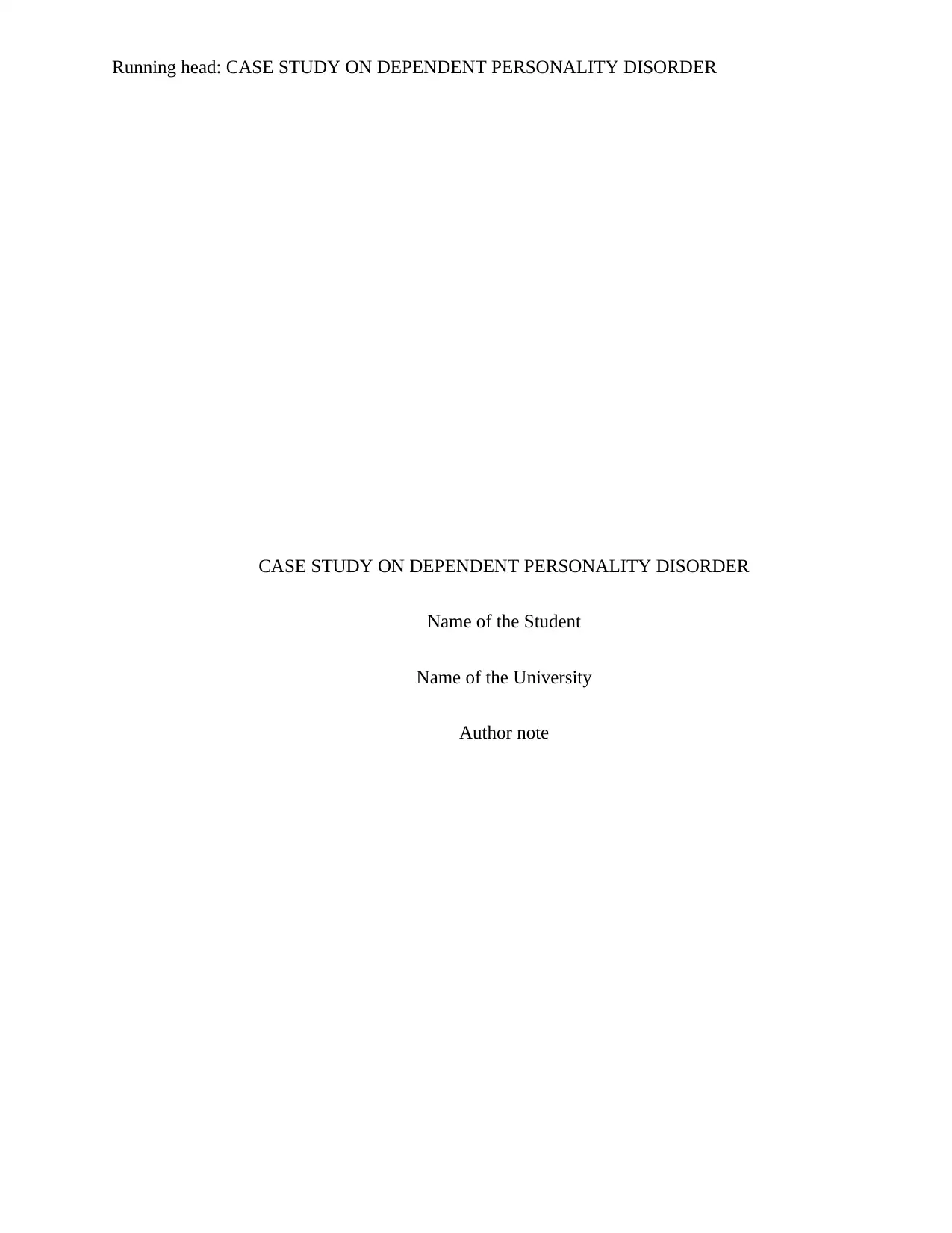
Running head: CASE STUDY ON DEPENDENT PERSONALITY DISORDER
CASE STUDY ON DEPENDENT PERSONALITY DISORDER
Name of the Student
Name of the University
Author note
CASE STUDY ON DEPENDENT PERSONALITY DISORDER
Name of the Student
Name of the University
Author note
Paraphrase This Document
Need a fresh take? Get an instant paraphrase of this document with our AI Paraphraser
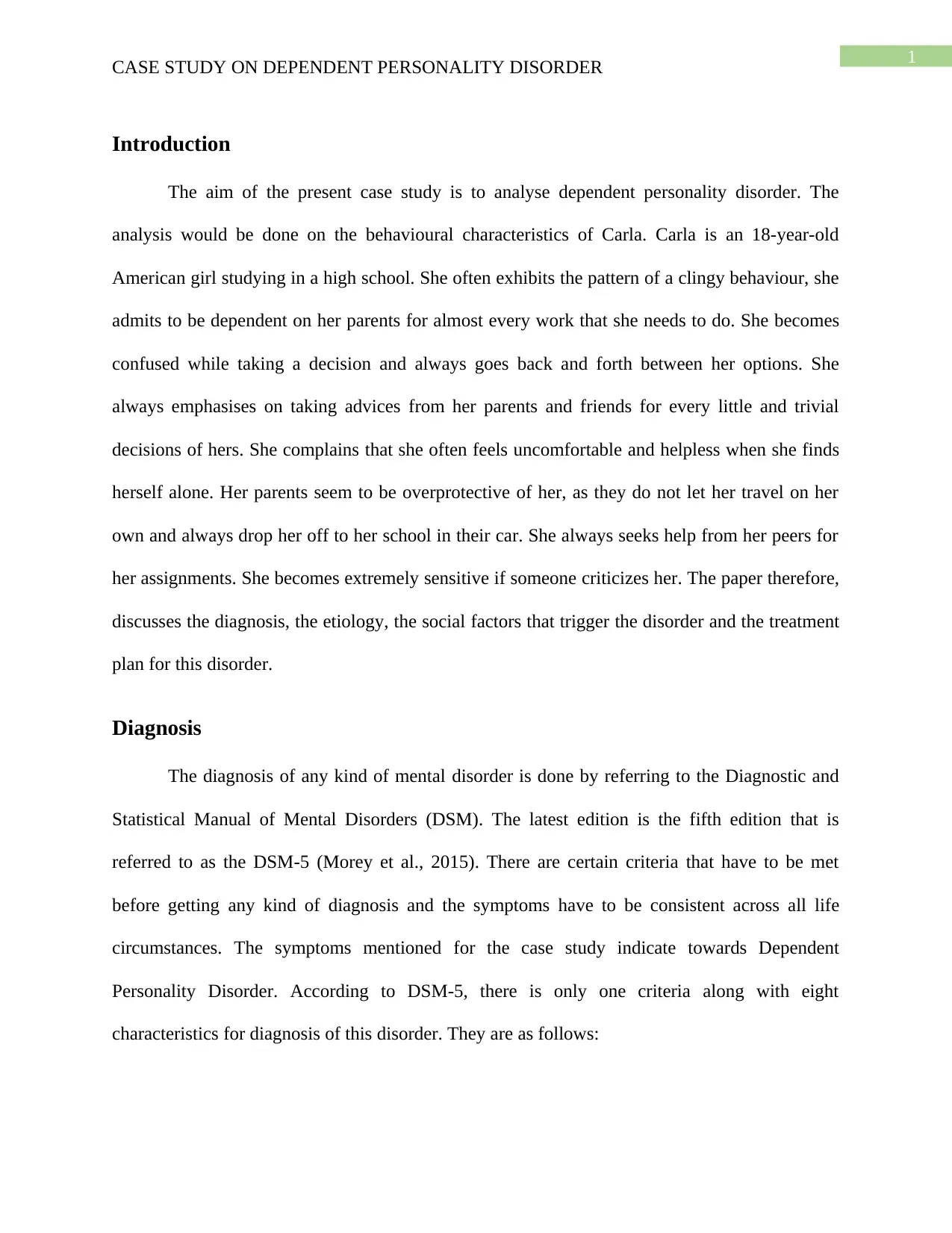
1
CASE STUDY ON DEPENDENT PERSONALITY DISORDER
Introduction
The aim of the present case study is to analyse dependent personality disorder. The
analysis would be done on the behavioural characteristics of Carla. Carla is an 18-year-old
American girl studying in a high school. She often exhibits the pattern of a clingy behaviour, she
admits to be dependent on her parents for almost every work that she needs to do. She becomes
confused while taking a decision and always goes back and forth between her options. She
always emphasises on taking advices from her parents and friends for every little and trivial
decisions of hers. She complains that she often feels uncomfortable and helpless when she finds
herself alone. Her parents seem to be overprotective of her, as they do not let her travel on her
own and always drop her off to her school in their car. She always seeks help from her peers for
her assignments. She becomes extremely sensitive if someone criticizes her. The paper therefore,
discusses the diagnosis, the etiology, the social factors that trigger the disorder and the treatment
plan for this disorder.
Diagnosis
The diagnosis of any kind of mental disorder is done by referring to the Diagnostic and
Statistical Manual of Mental Disorders (DSM). The latest edition is the fifth edition that is
referred to as the DSM-5 (Morey et al., 2015). There are certain criteria that have to be met
before getting any kind of diagnosis and the symptoms have to be consistent across all life
circumstances. The symptoms mentioned for the case study indicate towards Dependent
Personality Disorder. According to DSM-5, there is only one criteria along with eight
characteristics for diagnosis of this disorder. They are as follows:
CASE STUDY ON DEPENDENT PERSONALITY DISORDER
Introduction
The aim of the present case study is to analyse dependent personality disorder. The
analysis would be done on the behavioural characteristics of Carla. Carla is an 18-year-old
American girl studying in a high school. She often exhibits the pattern of a clingy behaviour, she
admits to be dependent on her parents for almost every work that she needs to do. She becomes
confused while taking a decision and always goes back and forth between her options. She
always emphasises on taking advices from her parents and friends for every little and trivial
decisions of hers. She complains that she often feels uncomfortable and helpless when she finds
herself alone. Her parents seem to be overprotective of her, as they do not let her travel on her
own and always drop her off to her school in their car. She always seeks help from her peers for
her assignments. She becomes extremely sensitive if someone criticizes her. The paper therefore,
discusses the diagnosis, the etiology, the social factors that trigger the disorder and the treatment
plan for this disorder.
Diagnosis
The diagnosis of any kind of mental disorder is done by referring to the Diagnostic and
Statistical Manual of Mental Disorders (DSM). The latest edition is the fifth edition that is
referred to as the DSM-5 (Morey et al., 2015). There are certain criteria that have to be met
before getting any kind of diagnosis and the symptoms have to be consistent across all life
circumstances. The symptoms mentioned for the case study indicate towards Dependent
Personality Disorder. According to DSM-5, there is only one criteria along with eight
characteristics for diagnosis of this disorder. They are as follows:
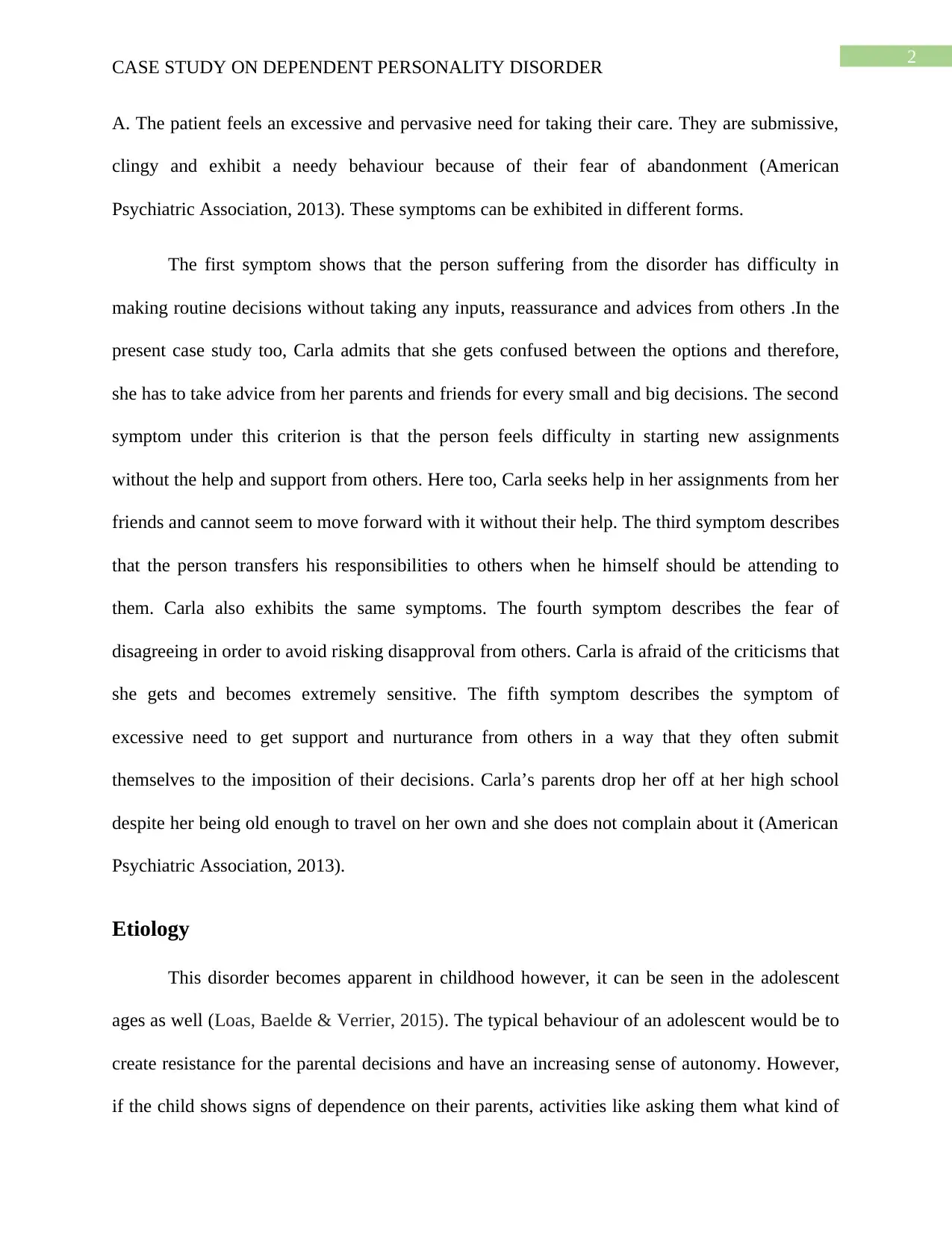
2
CASE STUDY ON DEPENDENT PERSONALITY DISORDER
A. The patient feels an excessive and pervasive need for taking their care. They are submissive,
clingy and exhibit a needy behaviour because of their fear of abandonment (American
Psychiatric Association, 2013). These symptoms can be exhibited in different forms.
The first symptom shows that the person suffering from the disorder has difficulty in
making routine decisions without taking any inputs, reassurance and advices from others .In the
present case study too, Carla admits that she gets confused between the options and therefore,
she has to take advice from her parents and friends for every small and big decisions. The second
symptom under this criterion is that the person feels difficulty in starting new assignments
without the help and support from others. Here too, Carla seeks help in her assignments from her
friends and cannot seem to move forward with it without their help. The third symptom describes
that the person transfers his responsibilities to others when he himself should be attending to
them. Carla also exhibits the same symptoms. The fourth symptom describes the fear of
disagreeing in order to avoid risking disapproval from others. Carla is afraid of the criticisms that
she gets and becomes extremely sensitive. The fifth symptom describes the symptom of
excessive need to get support and nurturance from others in a way that they often submit
themselves to the imposition of their decisions. Carla’s parents drop her off at her high school
despite her being old enough to travel on her own and she does not complain about it (American
Psychiatric Association, 2013).
Etiology
This disorder becomes apparent in childhood however, it can be seen in the adolescent
ages as well (Loas, Baelde & Verrier, 2015). The typical behaviour of an adolescent would be to
create resistance for the parental decisions and have an increasing sense of autonomy. However,
if the child shows signs of dependence on their parents, activities like asking them what kind of
CASE STUDY ON DEPENDENT PERSONALITY DISORDER
A. The patient feels an excessive and pervasive need for taking their care. They are submissive,
clingy and exhibit a needy behaviour because of their fear of abandonment (American
Psychiatric Association, 2013). These symptoms can be exhibited in different forms.
The first symptom shows that the person suffering from the disorder has difficulty in
making routine decisions without taking any inputs, reassurance and advices from others .In the
present case study too, Carla admits that she gets confused between the options and therefore,
she has to take advice from her parents and friends for every small and big decisions. The second
symptom under this criterion is that the person feels difficulty in starting new assignments
without the help and support from others. Here too, Carla seeks help in her assignments from her
friends and cannot seem to move forward with it without their help. The third symptom describes
that the person transfers his responsibilities to others when he himself should be attending to
them. Carla also exhibits the same symptoms. The fourth symptom describes the fear of
disagreeing in order to avoid risking disapproval from others. Carla is afraid of the criticisms that
she gets and becomes extremely sensitive. The fifth symptom describes the symptom of
excessive need to get support and nurturance from others in a way that they often submit
themselves to the imposition of their decisions. Carla’s parents drop her off at her high school
despite her being old enough to travel on her own and she does not complain about it (American
Psychiatric Association, 2013).
Etiology
This disorder becomes apparent in childhood however, it can be seen in the adolescent
ages as well (Loas, Baelde & Verrier, 2015). The typical behaviour of an adolescent would be to
create resistance for the parental decisions and have an increasing sense of autonomy. However,
if the child shows signs of dependence on their parents, activities like asking them what kind of
⊘ This is a preview!⊘
Do you want full access?
Subscribe today to unlock all pages.

Trusted by 1+ million students worldwide
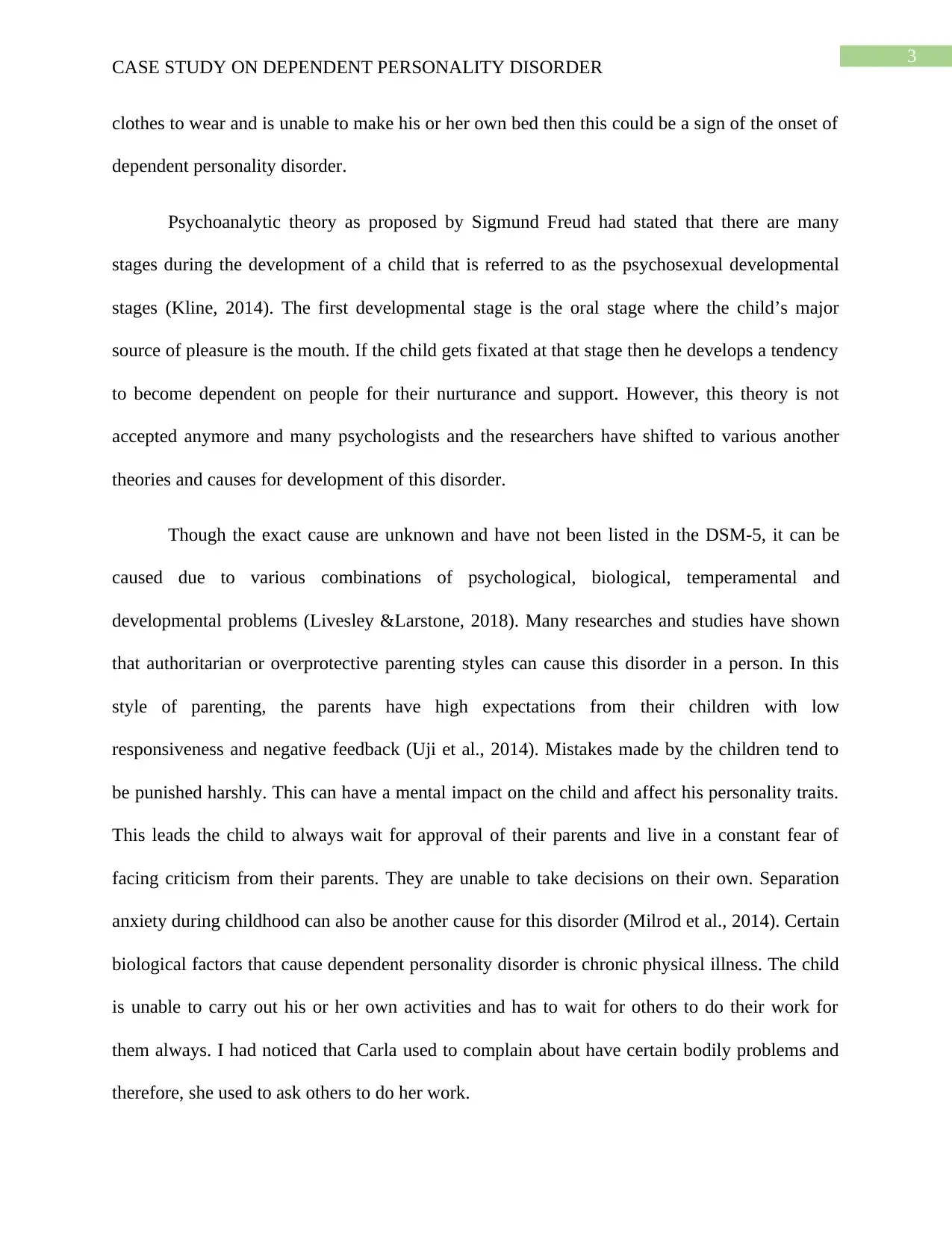
3
CASE STUDY ON DEPENDENT PERSONALITY DISORDER
clothes to wear and is unable to make his or her own bed then this could be a sign of the onset of
dependent personality disorder.
Psychoanalytic theory as proposed by Sigmund Freud had stated that there are many
stages during the development of a child that is referred to as the psychosexual developmental
stages (Kline, 2014). The first developmental stage is the oral stage where the child’s major
source of pleasure is the mouth. If the child gets fixated at that stage then he develops a tendency
to become dependent on people for their nurturance and support. However, this theory is not
accepted anymore and many psychologists and the researchers have shifted to various another
theories and causes for development of this disorder.
Though the exact cause are unknown and have not been listed in the DSM-5, it can be
caused due to various combinations of psychological, biological, temperamental and
developmental problems (Livesley &Larstone, 2018). Many researches and studies have shown
that authoritarian or overprotective parenting styles can cause this disorder in a person. In this
style of parenting, the parents have high expectations from their children with low
responsiveness and negative feedback (Uji et al., 2014). Mistakes made by the children tend to
be punished harshly. This can have a mental impact on the child and affect his personality traits.
This leads the child to always wait for approval of their parents and live in a constant fear of
facing criticism from their parents. They are unable to take decisions on their own. Separation
anxiety during childhood can also be another cause for this disorder (Milrod et al., 2014). Certain
biological factors that cause dependent personality disorder is chronic physical illness. The child
is unable to carry out his or her own activities and has to wait for others to do their work for
them always. I had noticed that Carla used to complain about have certain bodily problems and
therefore, she used to ask others to do her work.
CASE STUDY ON DEPENDENT PERSONALITY DISORDER
clothes to wear and is unable to make his or her own bed then this could be a sign of the onset of
dependent personality disorder.
Psychoanalytic theory as proposed by Sigmund Freud had stated that there are many
stages during the development of a child that is referred to as the psychosexual developmental
stages (Kline, 2014). The first developmental stage is the oral stage where the child’s major
source of pleasure is the mouth. If the child gets fixated at that stage then he develops a tendency
to become dependent on people for their nurturance and support. However, this theory is not
accepted anymore and many psychologists and the researchers have shifted to various another
theories and causes for development of this disorder.
Though the exact cause are unknown and have not been listed in the DSM-5, it can be
caused due to various combinations of psychological, biological, temperamental and
developmental problems (Livesley &Larstone, 2018). Many researches and studies have shown
that authoritarian or overprotective parenting styles can cause this disorder in a person. In this
style of parenting, the parents have high expectations from their children with low
responsiveness and negative feedback (Uji et al., 2014). Mistakes made by the children tend to
be punished harshly. This can have a mental impact on the child and affect his personality traits.
This leads the child to always wait for approval of their parents and live in a constant fear of
facing criticism from their parents. They are unable to take decisions on their own. Separation
anxiety during childhood can also be another cause for this disorder (Milrod et al., 2014). Certain
biological factors that cause dependent personality disorder is chronic physical illness. The child
is unable to carry out his or her own activities and has to wait for others to do their work for
them always. I had noticed that Carla used to complain about have certain bodily problems and
therefore, she used to ask others to do her work.
Paraphrase This Document
Need a fresh take? Get an instant paraphrase of this document with our AI Paraphraser
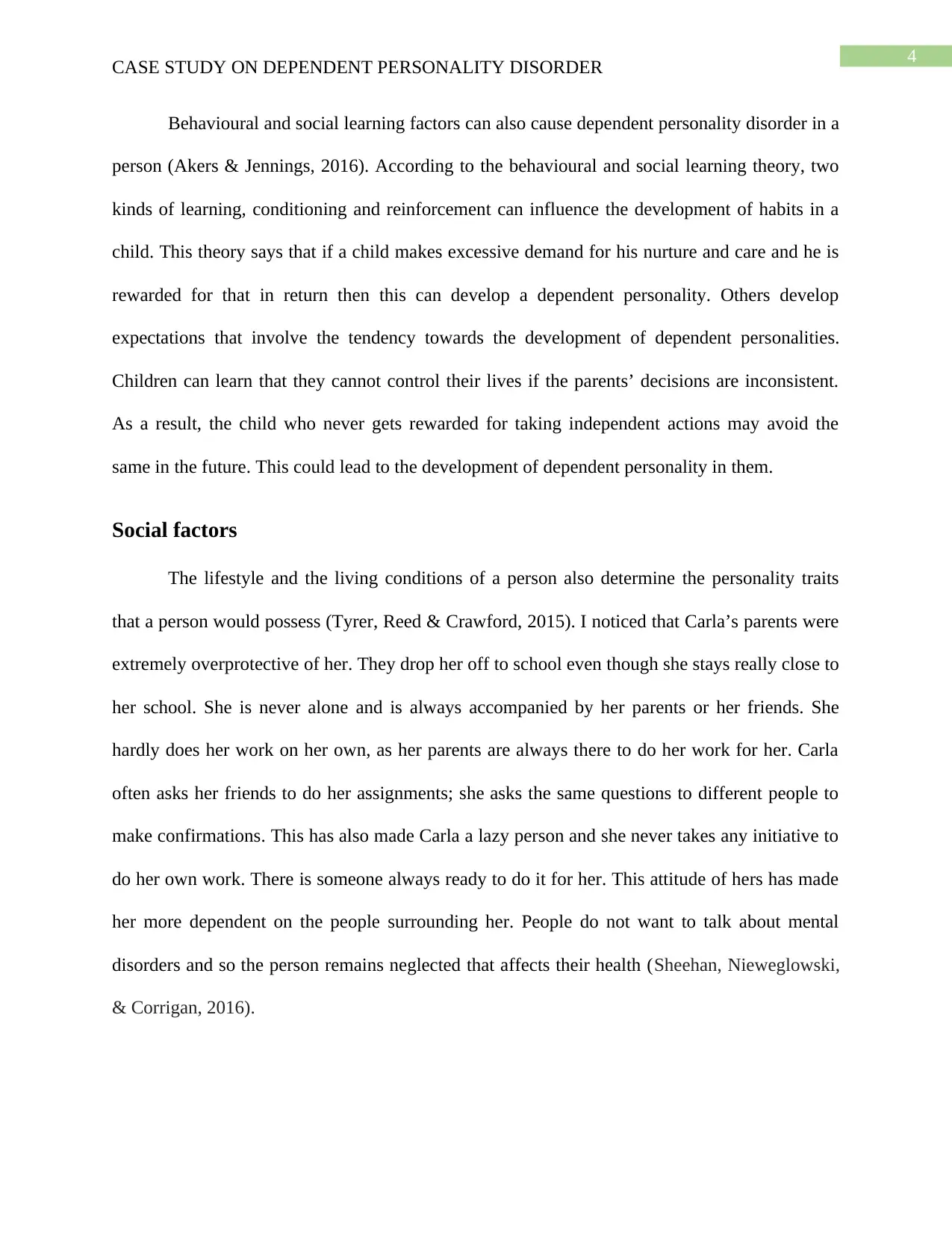
4
CASE STUDY ON DEPENDENT PERSONALITY DISORDER
Behavioural and social learning factors can also cause dependent personality disorder in a
person (Akers & Jennings, 2016). According to the behavioural and social learning theory, two
kinds of learning, conditioning and reinforcement can influence the development of habits in a
child. This theory says that if a child makes excessive demand for his nurture and care and he is
rewarded for that in return then this can develop a dependent personality. Others develop
expectations that involve the tendency towards the development of dependent personalities.
Children can learn that they cannot control their lives if the parents’ decisions are inconsistent.
As a result, the child who never gets rewarded for taking independent actions may avoid the
same in the future. This could lead to the development of dependent personality in them.
Social factors
The lifestyle and the living conditions of a person also determine the personality traits
that a person would possess (Tyrer, Reed & Crawford, 2015). I noticed that Carla’s parents were
extremely overprotective of her. They drop her off to school even though she stays really close to
her school. She is never alone and is always accompanied by her parents or her friends. She
hardly does her work on her own, as her parents are always there to do her work for her. Carla
often asks her friends to do her assignments; she asks the same questions to different people to
make confirmations. This has also made Carla a lazy person and she never takes any initiative to
do her own work. There is someone always ready to do it for her. This attitude of hers has made
her more dependent on the people surrounding her. People do not want to talk about mental
disorders and so the person remains neglected that affects their health (Sheehan, Nieweglowski,
& Corrigan, 2016).
CASE STUDY ON DEPENDENT PERSONALITY DISORDER
Behavioural and social learning factors can also cause dependent personality disorder in a
person (Akers & Jennings, 2016). According to the behavioural and social learning theory, two
kinds of learning, conditioning and reinforcement can influence the development of habits in a
child. This theory says that if a child makes excessive demand for his nurture and care and he is
rewarded for that in return then this can develop a dependent personality. Others develop
expectations that involve the tendency towards the development of dependent personalities.
Children can learn that they cannot control their lives if the parents’ decisions are inconsistent.
As a result, the child who never gets rewarded for taking independent actions may avoid the
same in the future. This could lead to the development of dependent personality in them.
Social factors
The lifestyle and the living conditions of a person also determine the personality traits
that a person would possess (Tyrer, Reed & Crawford, 2015). I noticed that Carla’s parents were
extremely overprotective of her. They drop her off to school even though she stays really close to
her school. She is never alone and is always accompanied by her parents or her friends. She
hardly does her work on her own, as her parents are always there to do her work for her. Carla
often asks her friends to do her assignments; she asks the same questions to different people to
make confirmations. This has also made Carla a lazy person and she never takes any initiative to
do her own work. There is someone always ready to do it for her. This attitude of hers has made
her more dependent on the people surrounding her. People do not want to talk about mental
disorders and so the person remains neglected that affects their health (Sheehan, Nieweglowski,
& Corrigan, 2016).
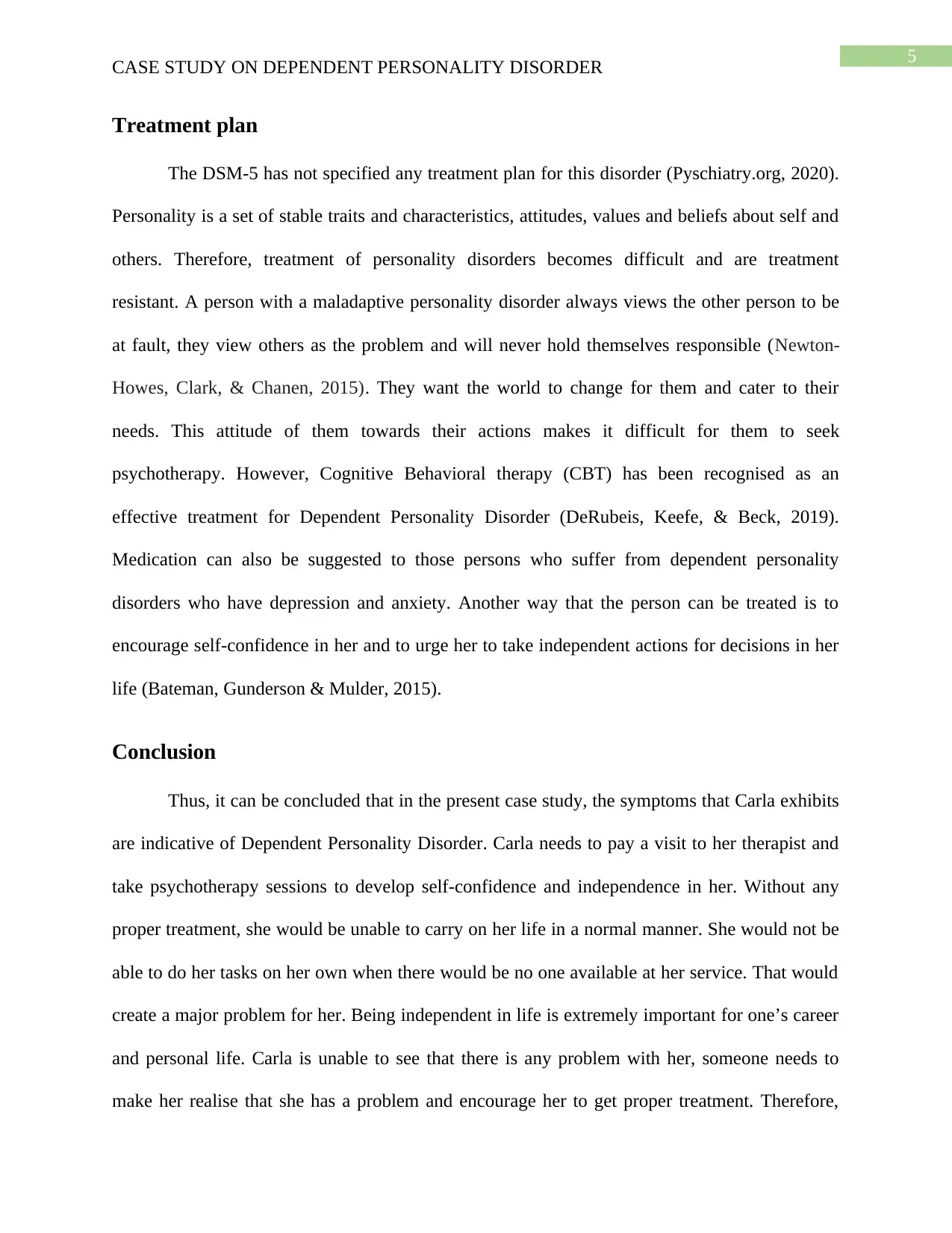
5
CASE STUDY ON DEPENDENT PERSONALITY DISORDER
Treatment plan
The DSM-5 has not specified any treatment plan for this disorder (Pyschiatry.org, 2020).
Personality is a set of stable traits and characteristics, attitudes, values and beliefs about self and
others. Therefore, treatment of personality disorders becomes difficult and are treatment
resistant. A person with a maladaptive personality disorder always views the other person to be
at fault, they view others as the problem and will never hold themselves responsible (Newton-
Howes, Clark, & Chanen, 2015). They want the world to change for them and cater to their
needs. This attitude of them towards their actions makes it difficult for them to seek
psychotherapy. However, Cognitive Behavioral therapy (CBT) has been recognised as an
effective treatment for Dependent Personality Disorder (DeRubeis, Keefe, & Beck, 2019).
Medication can also be suggested to those persons who suffer from dependent personality
disorders who have depression and anxiety. Another way that the person can be treated is to
encourage self-confidence in her and to urge her to take independent actions for decisions in her
life (Bateman, Gunderson & Mulder, 2015).
Conclusion
Thus, it can be concluded that in the present case study, the symptoms that Carla exhibits
are indicative of Dependent Personality Disorder. Carla needs to pay a visit to her therapist and
take psychotherapy sessions to develop self-confidence and independence in her. Without any
proper treatment, she would be unable to carry on her life in a normal manner. She would not be
able to do her tasks on her own when there would be no one available at her service. That would
create a major problem for her. Being independent in life is extremely important for one’s career
and personal life. Carla is unable to see that there is any problem with her, someone needs to
make her realise that she has a problem and encourage her to get proper treatment. Therefore,
CASE STUDY ON DEPENDENT PERSONALITY DISORDER
Treatment plan
The DSM-5 has not specified any treatment plan for this disorder (Pyschiatry.org, 2020).
Personality is a set of stable traits and characteristics, attitudes, values and beliefs about self and
others. Therefore, treatment of personality disorders becomes difficult and are treatment
resistant. A person with a maladaptive personality disorder always views the other person to be
at fault, they view others as the problem and will never hold themselves responsible (Newton-
Howes, Clark, & Chanen, 2015). They want the world to change for them and cater to their
needs. This attitude of them towards their actions makes it difficult for them to seek
psychotherapy. However, Cognitive Behavioral therapy (CBT) has been recognised as an
effective treatment for Dependent Personality Disorder (DeRubeis, Keefe, & Beck, 2019).
Medication can also be suggested to those persons who suffer from dependent personality
disorders who have depression and anxiety. Another way that the person can be treated is to
encourage self-confidence in her and to urge her to take independent actions for decisions in her
life (Bateman, Gunderson & Mulder, 2015).
Conclusion
Thus, it can be concluded that in the present case study, the symptoms that Carla exhibits
are indicative of Dependent Personality Disorder. Carla needs to pay a visit to her therapist and
take psychotherapy sessions to develop self-confidence and independence in her. Without any
proper treatment, she would be unable to carry on her life in a normal manner. She would not be
able to do her tasks on her own when there would be no one available at her service. That would
create a major problem for her. Being independent in life is extremely important for one’s career
and personal life. Carla is unable to see that there is any problem with her, someone needs to
make her realise that she has a problem and encourage her to get proper treatment. Therefore,
⊘ This is a preview!⊘
Do you want full access?
Subscribe today to unlock all pages.

Trusted by 1+ million students worldwide

6
CASE STUDY ON DEPENDENT PERSONALITY DISORDER
Carla should be taking medications and treatment for her healthy recovery from this disorder that
is cramping up her life.
CASE STUDY ON DEPENDENT PERSONALITY DISORDER
Carla should be taking medications and treatment for her healthy recovery from this disorder that
is cramping up her life.
Paraphrase This Document
Need a fresh take? Get an instant paraphrase of this document with our AI Paraphraser
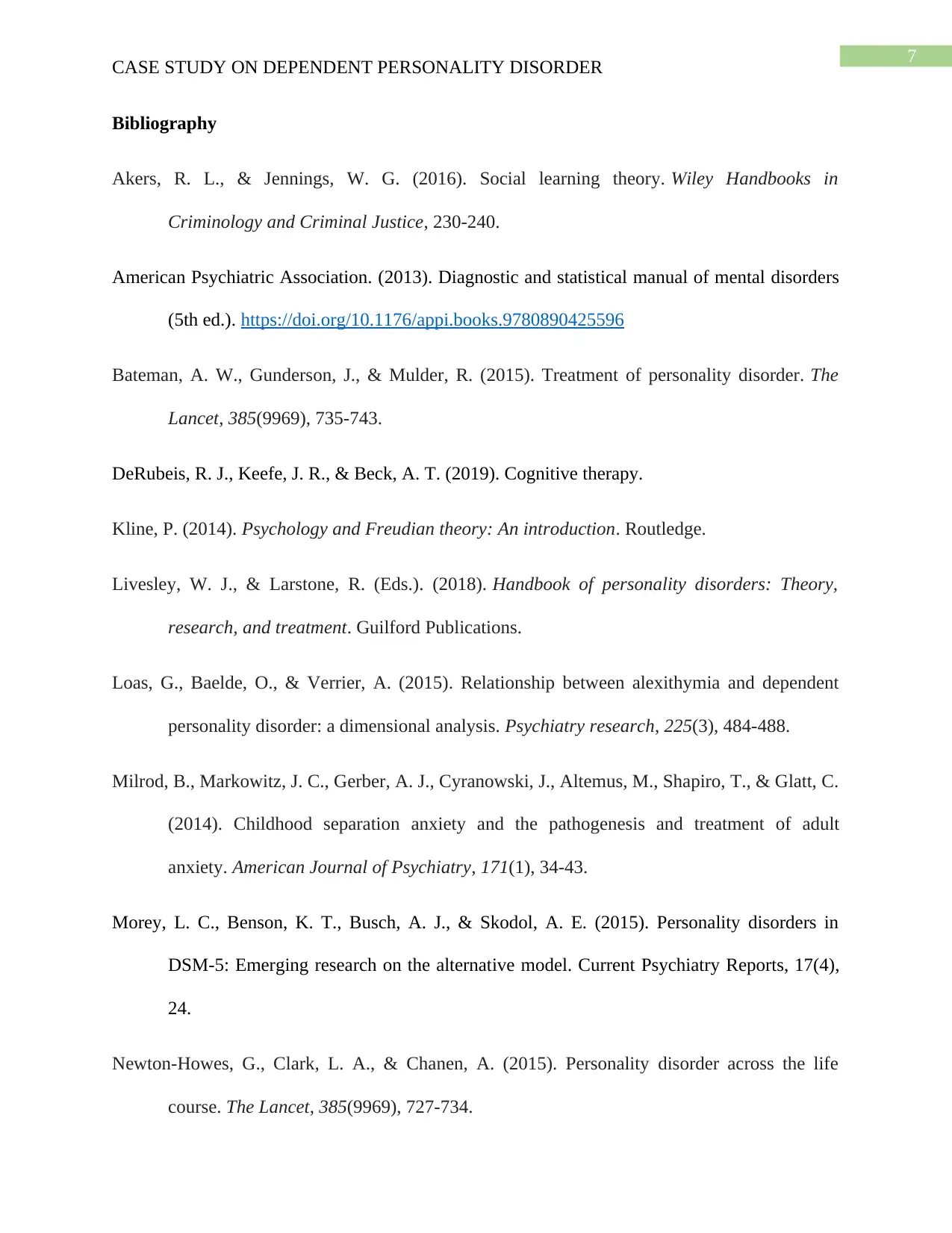
7
CASE STUDY ON DEPENDENT PERSONALITY DISORDER
Bibliography
Akers, R. L., & Jennings, W. G. (2016). Social learning theory. Wiley Handbooks in
Criminology and Criminal Justice, 230-240.
American Psychiatric Association. (2013). Diagnostic and statistical manual of mental disorders
(5th ed.). https://doi.org/10.1176/appi.books.9780890425596
Bateman, A. W., Gunderson, J., & Mulder, R. (2015). Treatment of personality disorder. The
Lancet, 385(9969), 735-743.
DeRubeis, R. J., Keefe, J. R., & Beck, A. T. (2019). Cognitive therapy.
Kline, P. (2014). Psychology and Freudian theory: An introduction. Routledge.
Livesley, W. J., & Larstone, R. (Eds.). (2018). Handbook of personality disorders: Theory,
research, and treatment. Guilford Publications.
Loas, G., Baelde, O., & Verrier, A. (2015). Relationship between alexithymia and dependent
personality disorder: a dimensional analysis. Psychiatry research, 225(3), 484-488.
Milrod, B., Markowitz, J. C., Gerber, A. J., Cyranowski, J., Altemus, M., Shapiro, T., & Glatt, C.
(2014). Childhood separation anxiety and the pathogenesis and treatment of adult
anxiety. American Journal of Psychiatry, 171(1), 34-43.
Morey, L. C., Benson, K. T., Busch, A. J., & Skodol, A. E. (2015). Personality disorders in
DSM-5: Emerging research on the alternative model. Current Psychiatry Reports, 17(4),
24.
Newton-Howes, G., Clark, L. A., & Chanen, A. (2015). Personality disorder across the life
course. The Lancet, 385(9969), 727-734.
CASE STUDY ON DEPENDENT PERSONALITY DISORDER
Bibliography
Akers, R. L., & Jennings, W. G. (2016). Social learning theory. Wiley Handbooks in
Criminology and Criminal Justice, 230-240.
American Psychiatric Association. (2013). Diagnostic and statistical manual of mental disorders
(5th ed.). https://doi.org/10.1176/appi.books.9780890425596
Bateman, A. W., Gunderson, J., & Mulder, R. (2015). Treatment of personality disorder. The
Lancet, 385(9969), 735-743.
DeRubeis, R. J., Keefe, J. R., & Beck, A. T. (2019). Cognitive therapy.
Kline, P. (2014). Psychology and Freudian theory: An introduction. Routledge.
Livesley, W. J., & Larstone, R. (Eds.). (2018). Handbook of personality disorders: Theory,
research, and treatment. Guilford Publications.
Loas, G., Baelde, O., & Verrier, A. (2015). Relationship between alexithymia and dependent
personality disorder: a dimensional analysis. Psychiatry research, 225(3), 484-488.
Milrod, B., Markowitz, J. C., Gerber, A. J., Cyranowski, J., Altemus, M., Shapiro, T., & Glatt, C.
(2014). Childhood separation anxiety and the pathogenesis and treatment of adult
anxiety. American Journal of Psychiatry, 171(1), 34-43.
Morey, L. C., Benson, K. T., Busch, A. J., & Skodol, A. E. (2015). Personality disorders in
DSM-5: Emerging research on the alternative model. Current Psychiatry Reports, 17(4),
24.
Newton-Howes, G., Clark, L. A., & Chanen, A. (2015). Personality disorder across the life
course. The Lancet, 385(9969), 727-734.
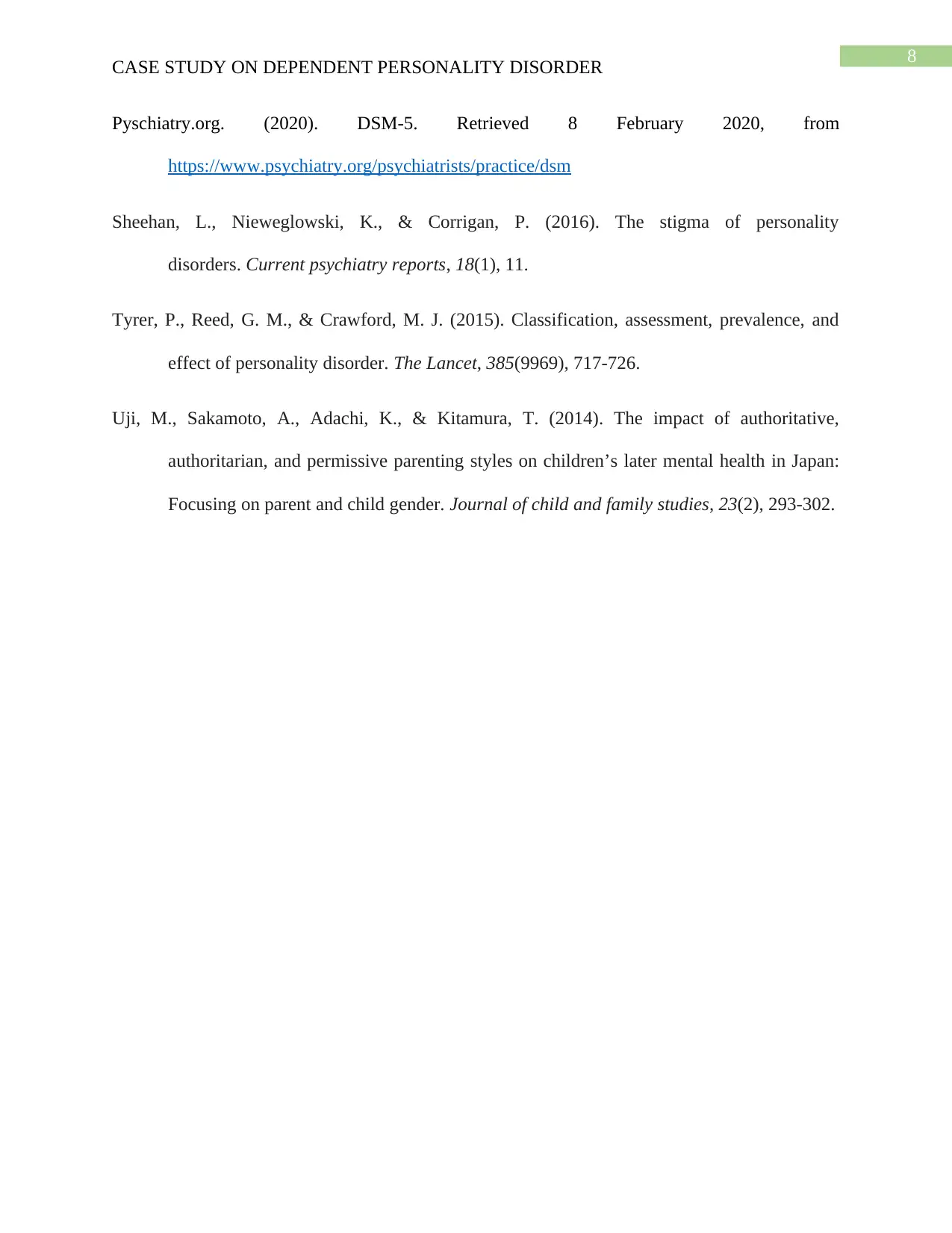
8
CASE STUDY ON DEPENDENT PERSONALITY DISORDER
Pyschiatry.org. (2020). DSM-5. Retrieved 8 February 2020, from
https://www.psychiatry.org/psychiatrists/practice/dsm
Sheehan, L., Nieweglowski, K., & Corrigan, P. (2016). The stigma of personality
disorders. Current psychiatry reports, 18(1), 11.
Tyrer, P., Reed, G. M., & Crawford, M. J. (2015). Classification, assessment, prevalence, and
effect of personality disorder. The Lancet, 385(9969), 717-726.
Uji, M., Sakamoto, A., Adachi, K., & Kitamura, T. (2014). The impact of authoritative,
authoritarian, and permissive parenting styles on children’s later mental health in Japan:
Focusing on parent and child gender. Journal of child and family studies, 23(2), 293-302.
CASE STUDY ON DEPENDENT PERSONALITY DISORDER
Pyschiatry.org. (2020). DSM-5. Retrieved 8 February 2020, from
https://www.psychiatry.org/psychiatrists/practice/dsm
Sheehan, L., Nieweglowski, K., & Corrigan, P. (2016). The stigma of personality
disorders. Current psychiatry reports, 18(1), 11.
Tyrer, P., Reed, G. M., & Crawford, M. J. (2015). Classification, assessment, prevalence, and
effect of personality disorder. The Lancet, 385(9969), 717-726.
Uji, M., Sakamoto, A., Adachi, K., & Kitamura, T. (2014). The impact of authoritative,
authoritarian, and permissive parenting styles on children’s later mental health in Japan:
Focusing on parent and child gender. Journal of child and family studies, 23(2), 293-302.
⊘ This is a preview!⊘
Do you want full access?
Subscribe today to unlock all pages.

Trusted by 1+ million students worldwide
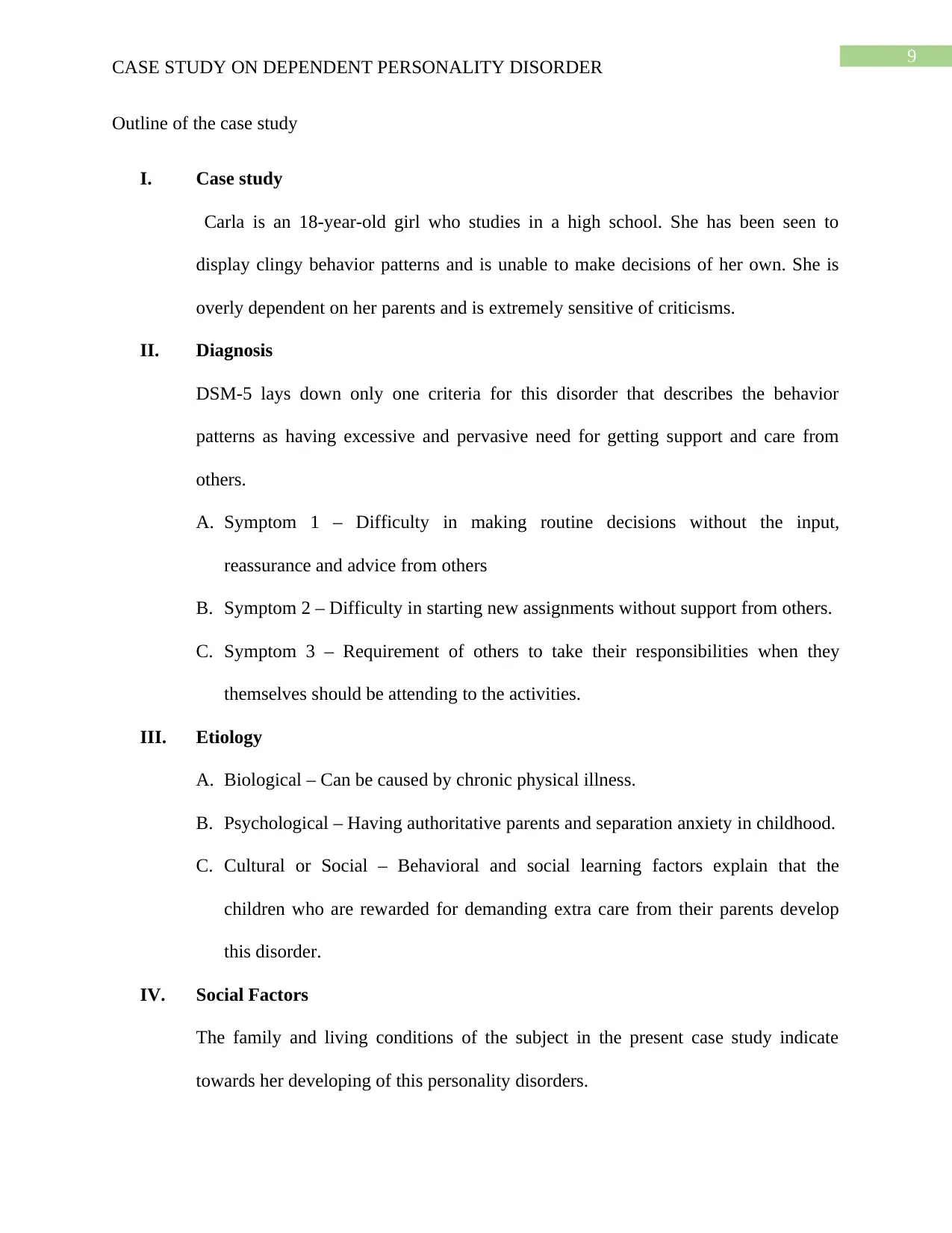
9
CASE STUDY ON DEPENDENT PERSONALITY DISORDER
Outline of the case study
I. Case study
Carla is an 18-year-old girl who studies in a high school. She has been seen to
display clingy behavior patterns and is unable to make decisions of her own. She is
overly dependent on her parents and is extremely sensitive of criticisms.
II. Diagnosis
DSM-5 lays down only one criteria for this disorder that describes the behavior
patterns as having excessive and pervasive need for getting support and care from
others.
A. Symptom 1 – Difficulty in making routine decisions without the input,
reassurance and advice from others
B. Symptom 2 – Difficulty in starting new assignments without support from others.
C. Symptom 3 – Requirement of others to take their responsibilities when they
themselves should be attending to the activities.
III. Etiology
A. Biological – Can be caused by chronic physical illness.
B. Psychological – Having authoritative parents and separation anxiety in childhood.
C. Cultural or Social – Behavioral and social learning factors explain that the
children who are rewarded for demanding extra care from their parents develop
this disorder.
IV. Social Factors
The family and living conditions of the subject in the present case study indicate
towards her developing of this personality disorders.
CASE STUDY ON DEPENDENT PERSONALITY DISORDER
Outline of the case study
I. Case study
Carla is an 18-year-old girl who studies in a high school. She has been seen to
display clingy behavior patterns and is unable to make decisions of her own. She is
overly dependent on her parents and is extremely sensitive of criticisms.
II. Diagnosis
DSM-5 lays down only one criteria for this disorder that describes the behavior
patterns as having excessive and pervasive need for getting support and care from
others.
A. Symptom 1 – Difficulty in making routine decisions without the input,
reassurance and advice from others
B. Symptom 2 – Difficulty in starting new assignments without support from others.
C. Symptom 3 – Requirement of others to take their responsibilities when they
themselves should be attending to the activities.
III. Etiology
A. Biological – Can be caused by chronic physical illness.
B. Psychological – Having authoritative parents and separation anxiety in childhood.
C. Cultural or Social – Behavioral and social learning factors explain that the
children who are rewarded for demanding extra care from their parents develop
this disorder.
IV. Social Factors
The family and living conditions of the subject in the present case study indicate
towards her developing of this personality disorders.
Paraphrase This Document
Need a fresh take? Get an instant paraphrase of this document with our AI Paraphraser
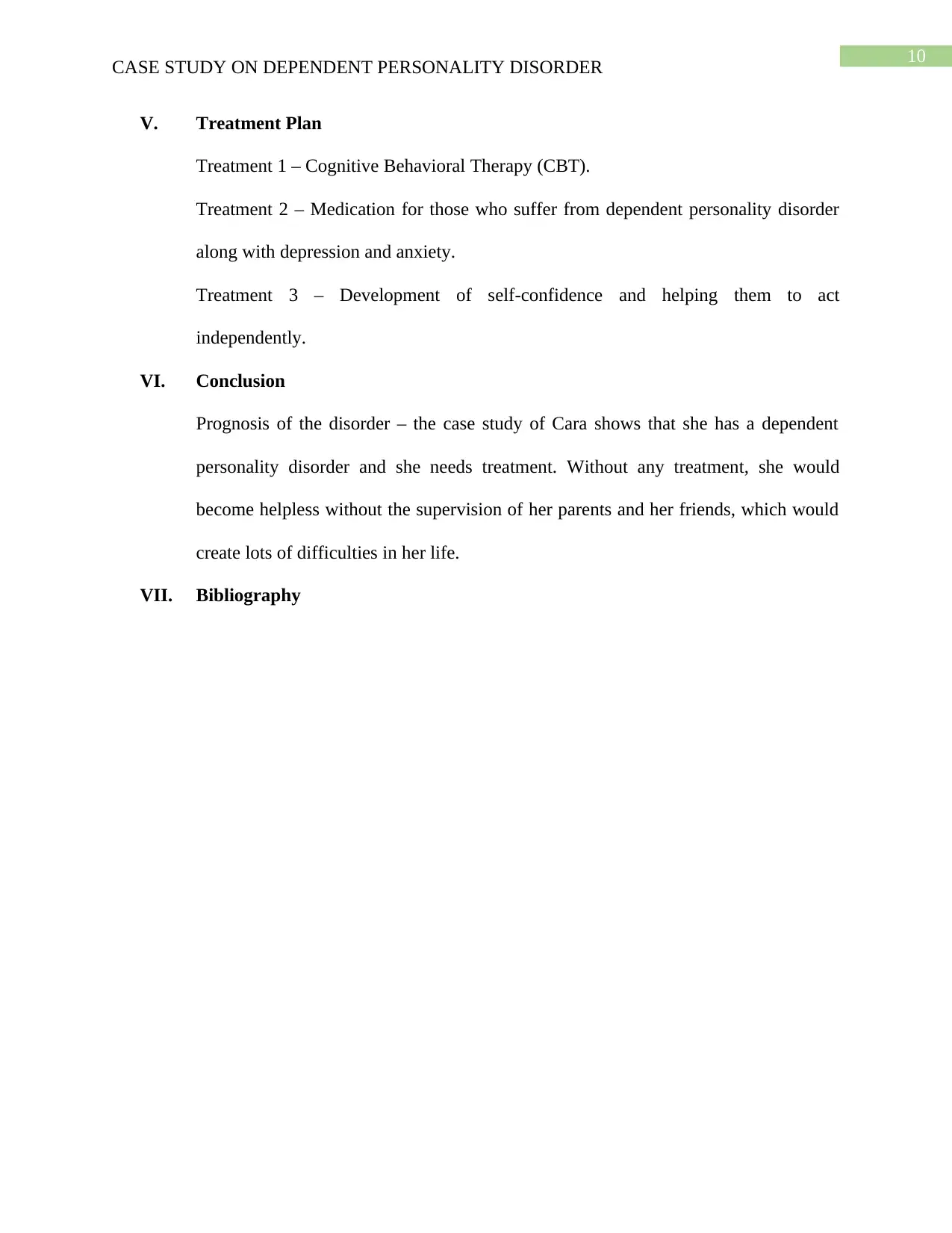
10
CASE STUDY ON DEPENDENT PERSONALITY DISORDER
V. Treatment Plan
Treatment 1 – Cognitive Behavioral Therapy (CBT).
Treatment 2 – Medication for those who suffer from dependent personality disorder
along with depression and anxiety.
Treatment 3 – Development of self-confidence and helping them to act
independently.
VI. Conclusion
Prognosis of the disorder – the case study of Cara shows that she has a dependent
personality disorder and she needs treatment. Without any treatment, she would
become helpless without the supervision of her parents and her friends, which would
create lots of difficulties in her life.
VII. Bibliography
CASE STUDY ON DEPENDENT PERSONALITY DISORDER
V. Treatment Plan
Treatment 1 – Cognitive Behavioral Therapy (CBT).
Treatment 2 – Medication for those who suffer from dependent personality disorder
along with depression and anxiety.
Treatment 3 – Development of self-confidence and helping them to act
independently.
VI. Conclusion
Prognosis of the disorder – the case study of Cara shows that she has a dependent
personality disorder and she needs treatment. Without any treatment, she would
become helpless without the supervision of her parents and her friends, which would
create lots of difficulties in her life.
VII. Bibliography
1 out of 11
Related Documents
Your All-in-One AI-Powered Toolkit for Academic Success.
+13062052269
info@desklib.com
Available 24*7 on WhatsApp / Email
![[object Object]](/_next/static/media/star-bottom.7253800d.svg)
Unlock your academic potential
Copyright © 2020–2026 A2Z Services. All Rights Reserved. Developed and managed by ZUCOL.





